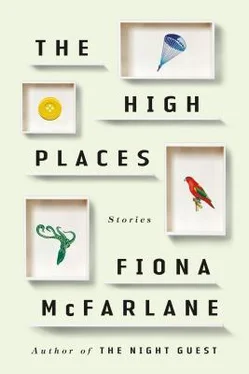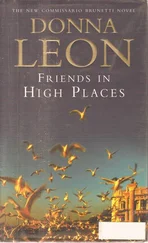The boy nodded. ‘All right, then,’ he said.
Jack felt a strange pulse in his side, the side closest to his son; he was aware of a tethering there, and he reached out his hand and put it on the boy’s shoulder.
‘Your mother will worry,’ he said, and the sheep all cried out together as if in agreement. But it was the absence of his wife and her worry, and of his pretty daughters, that made Jack’s calm possible. Without them he felt able to enter into a new arrangement with his son, which might turn out to be binding.
They drove all day to find a high place. There were a few mounds that sometimes looked like ancient burial sites and sometimes looked like piles of fossilised dung. But these mounds were high only in relation to the flatness of the land around them. By midafternoon, a ridge of hills became visible to the west, but they hung on the horizon as the truck continued to clamber over the plain and nothing ever grew nearer or farther away. The road was very rough now. It might not have been a road. There was spare petrol in a jerry can, but the boy had brought no food and only a small bottle of water. Their mouths were so dry, they didn’t speak unless it was absolutely necessary, and for hours it was never absolutely necessary. At one point they swapped seats and Jack drove. The boy opened the glove box and showed him the slaughter knife he had placed there. The truck pointed into the west.
They reached the hills in the early evening. The sun was low on the other side of the hills; the gum trees on their tops were lit gold, but the twilight on the eastern slopes seemed to Jack to be the shadow of the day of resurrection. It was there in the permanence of the rock, the perpetual grey-green of the eucalyptus trees, and the great flocks of white parrots that rose into the air like souls. Jack was so thirsty by this time he’d begun to think about licking his own eyeballs. The sheep had been silent for hours. His son, however, was animated and alert. Jack worried that night would fall before they reached the tallest hill. What if they chose a hill thinking it seemed the highest, but when they woke in the morning saw it was overshadowed by something higher? So he drove faster among the hills, finding the road and losing it again, driving along the gullies between the rises, while the sky dissolved.
Just before it was fully dark, the truck went skidding over a sandy patch of old river and tipped into the ditch of a dry waterhole.
It wasn’t a deep hole. One good rain would soak it; one storm would fill it up. The truck hissed and the sheep scrambled onto the sloping ground. Jack and his son followed them up the rough sides of the hole. A hill rose above them, rounded in shape, and grass grew on it, which the sheep had seen or smelled. They butted against each other in their frenzy to eat, but Jack wouldn’t let them stop. He ran at and around them, the way his dogs did; he clicked and yapped, and his son ran and yapped too, the knife tucked into his belt. Jack’s lungs tightened and burned as he struggled up the hill. The sheep scattered and were frightened by the smallest noise, but were too tired to disobey. Although it was dark by the time they reached the top, with only a small piece of moon rising in the east-northeast, Jack could feel the weight of the view all around him, and how much closer he was to the sky.
The sheep settled down to eat. The boy made a ring of stones around a bare patch of earth, and Jack stripped bark and branches from trees. One stray spark and the hills would catch and the fire would race over the waterless plain, all the way to the house and the girls and their mother. But they knew how to build a good, safe fire. Jack was careful about the length of the branches and the boy packed the stones tight. The cigarette lighter flicked in the dark as the boy sought out stones, and its flame sprang and kindled as it met the waiting wood. The fire was like liquid pouring up and out of the branches; Jack would have liked to drink it.
The boy hit the sheep on the back of the head with the handle of the knife, one by one until they all lay stunned on the ground. Then he gave the knife to his father, who slit their throats and severed their spinal cords. Jack angled the knife so the blood ran out in a tidy pool. The smell of it rose over the burning wood. His son helped him throw the sheep onto the fire. The flames dulled and grew waxy around the first carcass. By the fourth, they had to load on more wood and widen the stone circle. The final sheep took some effort to place: they heaved it onto the top of the fire, but it rolled down. It required three attempts. By then the fire was so high it lit the whole top of the hill. A breeze lifted and blew, but the fire stayed in its circle of stones.
Jack looked into the sky, which, being night, wasn’t there.
‘Almighty God,’ he said. ‘Make it rain.’
The boy turned to his father. ‘That’s all you want? Rain?’
Jack felt his intestines pull tight.
‘When you could ask for anything?’ said the boy. ‘When God felled and raised you? When He spoke to you from the whirlwind? When you saw His hand?’
‘I didn’t see any hand,’ said Jack. He held his own hands behind his back. The blood on them had dried. He wanted to lift them to the sky, or raise them to the fire. He wanted in some way to satisfy his son. ‘What do you want, then?’
The boy turned back to the fire. ‘To be changed,’ he said.
* * *
They slept that night on the hill with the scratch of dirty grass and the smell of roasting sheep. There was a particular quality to Jack’s second night of bedless sleep. It was leaden without being deep. It afforded no visions: he knew he was hungry and thirsty on top of a stinking hill, that his wife was alone in their wide bed, wondering and calling out to God, imagining disasters of every kind and bowing her head to accept them, and there was dignity in this, and it was hopeless. But no disasters came as he lay on the grass; no trees toppled, no stars fell, no fire spread. No snakes or spiders crawled across the ground. The world, in the morning, hadn’t ended. So Jack expected, when he opened his eyes, to see the plain flooded with rain. Or if not that, then a clouded sky. Or at least to feel a barometric shift. He’d been obedient. He’d sought God. He had so few sheep to spare. But the early sky was empty.
Jack stood on the hilltop. It was so long since he’d seen an elevated view, and he was disgusted, standing there, by the terrible dry sloped world, the thinness he felt in the air around him, and the small distance between Heaven and Earth. He could look through one cloud and the sky was gone. He could look into the branches of a tree and watch Heaven’s light fall beside him. He could stand on a hill and see the hand of God, laid out there over the plain: each knuckle and vein, and all the fingers.
The boy moaned. He lay covered in ash next to the fire. His hair and fingernails were ashy-white. The sheep were black but still whole. Flies and ants gathered at the blood. Jack wondered what his son had seen and heard in the night. Had a voice come? A cloud? Or some other thing that might visit a holy boy? But the boy only moaned in the ash. The moans were forced and slack. Jack stood above, looking down, as his son curled and wept. The change had come in the night, with the fire and the absence of voice and cloud. The boy was real now. He was abandoned and ready, again, to be loved. He turned his face into the ash; he breathed and coughed it. The sun was already heating the little dew.
The stories in this book were written over a period of ten years, and in that time many people offered me assistance, support, feedback, encouragement, and love. I’m so thankful to all of them, and these ones in particular:
Читать дальше












